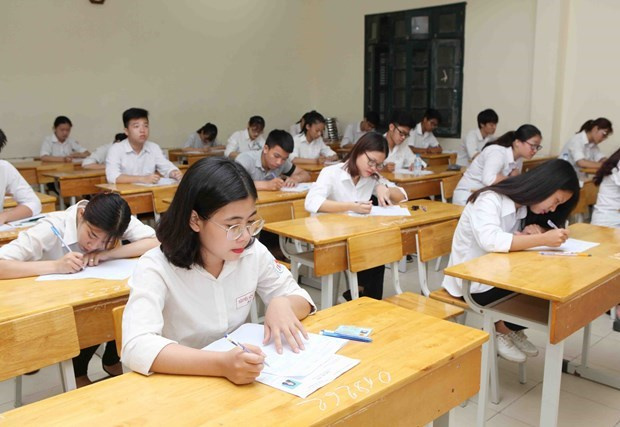Undergraduate Education in Vietnam
Like other countries in the world, undergraduate education is voluntary in Vietnam, which means that students can choose to either enter the labor force or continue studying after graduating from high school. However, many students prefer to pursue university, college, or vocational training to improve job prospects and build successful careers.
Entrance examination
Students graduating from high school typically take the National High School Graduation Examination (TN THPT) in June, which also serves as the gateway to public universities. Scores are released in July and form the basis for admission to public universities, colleges, vocational schools, and most private institutions. Early admissions have been discontinued; all candidates now participate in a unified admission process managed by the Ministry of Education and Training.
 Photo : zingnews.vn
Photo : zingnews.vn
The examination groups subjects into fixed combinations: Group A (Mathematics, Physics, Chemistry), Group B (Mathematics, Biology, Chemistry), Group C (Literature, History, Geography), and Group D (Literature, Foreign Language, Mathematics). For 2025, additional groups such as H, M, N, P, etc., continue to cover specific fields like arts, design, military, and teacher education.
Types of school
Vietnam’s higher education landscape is structured into three main types:
- Vocational schools teach practical skills for trades such as electricity, cooking, carpentry, and technical repair. Graduates may enter the workforce directly or pursue further studies at colleges or universities.
- Colleges offer three- to four-year programs similar to universities but generally serve students who did not meet university entry requirements. The curriculum is often narrower and less research-focused.
- Universities provide comprehensive programs in fields like economics, engineering, arts, and design. University degrees lead to improved job opportunities and higher starting salaries.
Universities in Vietnam are further classified into three categories:
- Public universities receive state funding, charge modest tuition (around $100–200 per year), and are well-regarded—though some suffer from rigid programs and outdated materials.
- Private universities, run by companies or individuals, usually charge higher fees (around $500 per year) but have lower entrance score thresholds and offer more flexible admission standards.
- International universities in Vietnam are branch campuses of foreign institutions (e.g., RMIT, British University Vietnam). They maintain international academic standards, charge much higher tuition, but offer qualifications recognized abroad.
Updates:
- Early university admissions have been completely removed in 2025; all students now use the unified national system.
- Students can replace the foreign language exam with a valid international language certificate.
- Universities may conduct their own aptitude tests—especially VNU and other leading institutions, combining logic, math, and problem-solving elements.
- The national exam has shifted toward more reasoning and application-oriented questions, including statistics, data analysis, and multiple-choice formats.
- Nearly 20 different admission pathways are now in use, including combinations of national exam results, high school transcripts, aptitude tests, interviews, and international certificates.

How to open a bank account in Vietnam as a foreigner
A comprehensive guide for non-residents living in Vietnam for an extended time.









